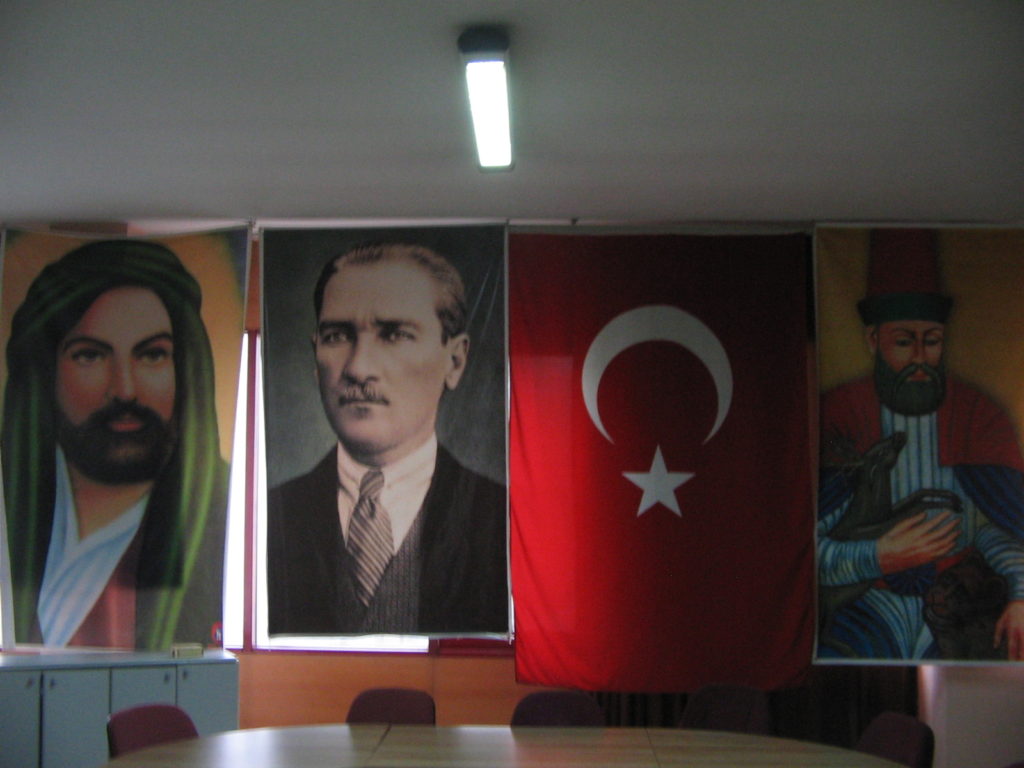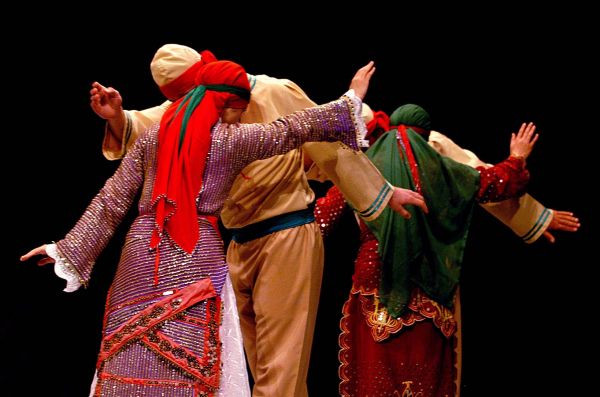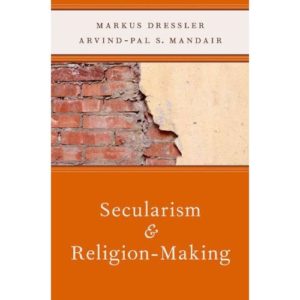A response to Markus Dressler’s essay, “Making Religion Through Secularist Legal Discourse: The Case of Turkish Alevism”

Typical Turkish Alevi tableau: Imam Ali, Ataturk, and the saint Haci Bektas. Photograph by Jeremy Walton.
On a rather chill afternoon in March of 2005, I sat across from Ali Bey, the president of the Cem Foundation, one of the largest civil society institutions dedicated to Turkey’s Alevi community in all of Istanbul. After calling to the kitchen to request a fresh round of tea, Ali Bey proceeded with his monologue:
Think of two families, one Sunni, one Alevi. The Sunni woman is wearing a headscarf, the man has a long beard, they appear to have just arrived from the village. Then look at the Alevi family: the man is clean-shaven, the woman has fine hair, the children are clean and well-dressed. Which of these two would you say is modern, secular? The Alevi family, of course. And yet the (Turkish) state does not recognize us as a legitimate minority. True secularism does not exist here.
These were not unfamiliar or unsurprising sentiments for me to encounter. Throughout two years of research with Alevi NGOs in both Istanbul and Ankara, I frequently spoke with Alevis who drew a direct connection between the ‘modernity’ and ‘secularity’ characteristic of most Alevis and the failures of Turkish secularism, which they typically understand to be fatally skewed in favor of Turkey’s Sunni Muslims. This irony—the ostensible failure of Turkey’s political and legal system of secularism to recognize its most ‘secular’ subjects as a legitimate religious minority—is the crucible and dynamo of much Alevi political mobilization.
Who are Turkey’s Alevis? More so than most religious, ethnic or cultural identities, the constituent features of “Alevism” are hotly debated among both Alevi and non-Alevi Turks. Because the Turkish state does not recognize Alevis, their exact numbers are difficult to estimate; most studies offer figures between ten and twenty percent of Turkey’s population of approximately eighty million. Doctrinally, Alevis share much in common with the Twelver Shi’a Muslims of Iran, Iraq and Lebanon. Alevis revere the Ahl al-Bayt, the quasi-nuclear family of the Prophet Muhammad, his daughter Fatima, his cousin and son-in-law Ali, and Ali and Fatima’s two sons, Hasan and Hussein, and recognize the legitimacy of the Imamate beginning with Ali; they place particular emphasis on the assassination of Hussein at the Battle of Karbala in 680 CE, and mourn his martyrdom each year on Ashura, the tenth day of the Islamic month of Muharram.
However, Alevis typically do not pray in mosques (as do both Sunnis and most Shi’a), and their distinctive ritual practice, the cem, derives in part from central Asian shamanistic precedents. Cem ceremonies consist of ritualized circumambulation on the part of both male and female participants, to the accompaniment of music played on lutes by assembled bards; the gender integration of the cem ritual is frequently adduced as evidence of Alevis’ primordial ‘modernity’. Finally, Alevism does not rely strongly on a textual tradition in the same manner as Sunni or Twelver Shi’a Islam; until quite recently, the central tenets and practices of Alevism were principally inherited on the basis of oral and gestural traditions.
Until the tsunami of urban migration that began radically to transform Turkish demographics during the 1950s and 1960s, most Alevis resided in rural villages in central Anatolia, relatively distant from metropolitan concerns of doctrinal orthodoxy and political coherence. For all of these reasons, Alevism remains a contested category. For some commentators, Alevism a religion is entirely separate from Islam; others identify it entirely with Twelver Shi’ism. Others still emphasize Alevis’ inheritance from several Medieval Anatolian Sufi saints. Finally, there remains intense disagreement over the relationship between Alevism and ethnicity: Although there are many Kurds in Turkey who identify as Alevi (especially from the southeast province of Tunceli/Dersim), recent years have witnessed deeply racialized ideologies of Alevism as exemplary of primordial, Central Asian Turkishness.
The emergence of Alevism as a collective religious and political identity, rooted especially in the institutions of Turkish civil society, has spurred a burgeoning academic cottage industry on Alevism in both Turkish and English. A recent, valuable contribution to the literature on Alevism is Markus Dressler’s insightful essay, “Making Religion through Secularist Legal Discourse: The Case of Turkish Alevism,” included in the volume Secularism & Religion-Making (Oxford University Press/American Academy of Religion, 2011), which Dressler co-edited.
In this essay, Dressler plumbs the relationship between the articulation of Alevism in general and Alevis’ recourse to law suits and other legal measures to advocate their collective interests—as he states at the outset of his presentation, his aspiration is “to inquire into the ways in which the recent reconceptualization of Alevism in religious terms relates to the laicist discourse on religion in Turkey (p.187).” Dressler’s conceptual and theoretical target is the recent academic literature on secularism; he places particular emphasis on the influential arguments of anthropologist Talal Asad. Taking up Asad’s analysis of secularism as a political principle and process of “religion-making”—the formation and authorization of certain types of religiosity—Dressler interrogates the constitutive role of secular legal practice and discourse in the formation of Alevism itself. He focuses on a number of suits and legal cases brought by Alevis against the Turkish state in recent years. Taken together, these suits and court cases have publicly articulated a set of related, integral Alevi concerns:
“(1) the question of Alevi representation within the state system of religious administration, that is, the DRA (Directorate of Religious Affairs), and the related question of receiving material support by the state; (2) the issue of representation of Alevism by the state, most fiercely contested in the context of mandatory religious school education and the presentation of Alevism in textbooks; (3) the question of who has the authority to signify Alevism, that is, the right to identify the meanings of Alevi symbols and practices; and (4) the question of the relationship of Alevism to Islam. (pp. 193-194).
Dressler’s provocative conclusion is that the engagement and interaction of Alevis with Turkey’s secular legal system has been pivotal to the consolidation of Alevism as a collective religious identity itself.
Having spent several years conducting research among Alevi NGOs in Istanbul and Ankara, I can confirm the near-fetishistic focus on legal dispute and recognition among Alevi organizations that Dressler examines. In spite of the myriad political and doctrinal differences among Alevi institutions, they are almost uniform in their devotion to championing their ideals by bringing suits against the state, a process that the anthropologists Jean and John Comaroff have usefully dubbed “lawfare.” Lawfare—the ideological position that legal dispute is the sole means to political and cultural ends—is deeply characteristic of Turkey’s Alevi institutions, and Dressler’s essay constitutes a crucial, comprehensive acknowledgement and theorization of this fact.
As an anthropologist of Alevism myself, I would merely add a series of questions and concerns to Dressler’s presentation. Dressler’s principal concern is to argue for the centrality of lawfare in the “religion-making” of Alevis, and he marshals the most thorough, persuasive argument to this effect in the recent literature on Alevism. I occasionally wonder whether he places too much causal emphasis on legal dispute and interaction, however. As several other anthropologists—notably Aykan Erdemir and Kabir Tambar—have emphasized, Alevism achieves articulation and mediation as a religion in ritual spaces and contexts, such as that of the cem ceremony, that are only distantly related to the concerns and disciplines of secular law. In my own research, I have forwarded the importance of the institutional domain of civil society as a distinctive nexus within which “religion-making” occurs in Turkey; while civil society is necessarily legally-circumscribed, the formations of piety and identity that inhabit it cannot be reduced to legal logics. I doubt that Dressler would contest this point, even as his own presentation foregrounds the importance of Alevi civil society institutions as legal actors.
More broadly, a focus on the multiple contexts within which Alevism is the subject and object of “religion-making” complicates the questions surrounding secularism that interest Dressler. Talal Asad has urged scholars of religion to attend to the relationship between secularism—a political system that coordinates the place of religion vis-à-vis the state—and ‘the secular’—a sociopolitical ontology that circumscribes religion as a private domain of individual belief. Dressler’s argument admirably details how Alevi actors relate to the laicist system of Turkish secularism on the basis of legal action, but it does not fully grasp the curious relationship between secularism and secularity that Alevis negotiate and navigate.
This ambivalent relationship is explicit in the quotation from Ali Bey with which I began this piece: In Ali Bey’s estimation, the political system of secularism in Turkey fails precisely because it does not adequately recognize Turkey’s most secular citizens, Alevis. This provocative apposition, in which secularism fails the criteria of secularity, imparts a final question with vital political and theoretical stakes: How does the process of “religion-making,” for Alevis or otherwise, mediate between political logics and collective aspirations that seem as though they should be mutually-constitutive, but are practically not? In other words, is the tension between secularism and the secular itself central to “religion-making,” and, if so, how?
Jeremy F. Walton is an assistant professor/faculty fellow in New York University’s Religious Studies Program.
Markus Dressler’s essay, “Making Religion Through Secularist Legal Discourse: The Case of Turkish Alevism,” appears in Secularism and Religion-Making (Oxford University Press), edited by Dressler and Arvind-Pal S. Mandair.


